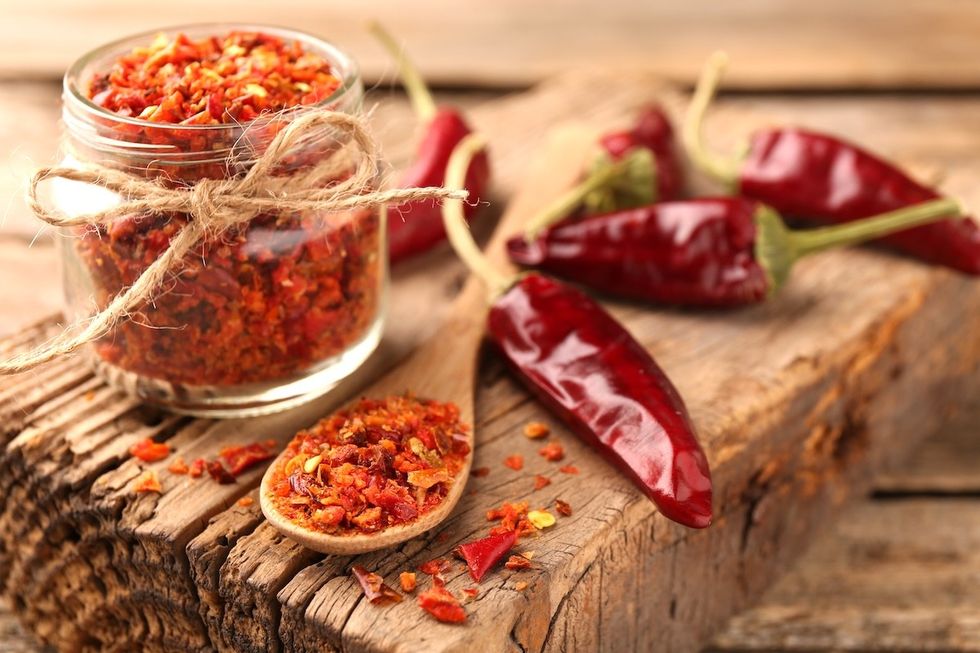If you’re looking for naturopathic ways to cut calories that don’t involve wacky fasting regimens or weight-loss injections, the answer may lie within your spice cabinet. A new study published in the journal Food Quality and Preference is encouraging folks to experiment more with spicy ingredients as a way of calorie control. Before you go buy hot paprika in bulk, here’s everything you need to know.
RELATED: This Food Can Trigger a 15% BMI Weight Loss—But You’re Probably Not Eating It.
Cooking with spicy ingredients can help with portion control, per new research.
Researchers at Penn State have seemingly unlocked a secret hack for weight loss and portion control: cooking with dried chili pepper. The new study found that increasing “oral burn” impacts how much food, or calories, people consume during a meal. Oral burn refers to the tingly feeling you get on your tongue and in the back of your mouth from spicy ingredients, such as chili pepper.
By adding an extra kick, a meal might be too spicy to finish all in one sitting. This results in smaller food portions, which leads to fewer consumed calories by default—all of which can contribute to natural weight loss, per the study.
“We know from previous studies that when people slow down, they eat significantly less,” Paige Cunningham, lead study author and a postdoctoral researcher, said in a news release. “We suspected that making a meal spicier might slow people down. We thought, let’s test, under controlled experimental conditions in the lab, if adding a small amount of spice, but not so much that the meal is inedible, will make people eat slower and therefore eat less.”
RELATED: Adding 2 Key Things to Your Diet Can Help You Lose Nearly 13% of Body Weight, Study Shows.
Hot paprika was linked to a reduction in food intake and eating speed.
Findings show that cooking with dried chili pepper caused participants to eat slower and eat less, but “without negatively affecting the palatability of the dish.”
The study involved 130 adults, who were served one of two meals: beef chili or tikka masala. To measure the behavioral and caloric effects that spice has on food, researchers prepared each meal in one of two ways: mild or spicy. As to how they achieved this, the authors said: “The spiciness level was controlled by carefully varying the ratio of hot versus sweet paprika added to the dishes to vary the heat while keeping chili flavor constant.”
To arrive at their results, researchers monitored eating behaviors, including how much water was consumed to counteract the spice. Other variables they observed were how much was consumed, meal duration, eating speed in grams per minute, bite rate, and bite size. They also asked participants to rate their appetite, meal enjoyment, and spiciness of the meal.
Researchers found that the spicier meals led to an 18 percent reduction in food intake and a 17 percent reduction in eating rating.
“This points to added chilies as a potential strategy for reducing the risk of energy overconsumption,” said study author John Hayes, a professor of food science at Penn State. “While portion control wasn’t the explicit goal of this study, our results suggest this might work. Next time you’re looking to eat a little less, try adding a blast of chilies, as it may slow you down and help you eat less.”
RELATED: If You Want to Lose Weight, “Avoid These Foods Like the Plague,” Fitness Expert Says.
Spicy foods can also boost metabolism.
Adding spicy foods to your diet can also improve your metabolism, or how fast your body breaks down nutrients and converts them to energy.
Kelsey Kunik, RDN, a registered dietitian and nutrition advisor for Zenmaster Wellness, previously told Best Life that hot peppers, whether eaten à la carte or in the form of hot sauce, contain capsaicin, “a compound that gives your metabolism a slight boost to burn more calories.”
As Best Life reported, “A 2022 study published in the journal Pharmaceuticals concluded that capsaicin could not only boost your metabolism but also help suppress appetite in the short term and restore healthy gut bacteria, promoting healthy weight management.”
Content shared from bestlifeonline.com.

